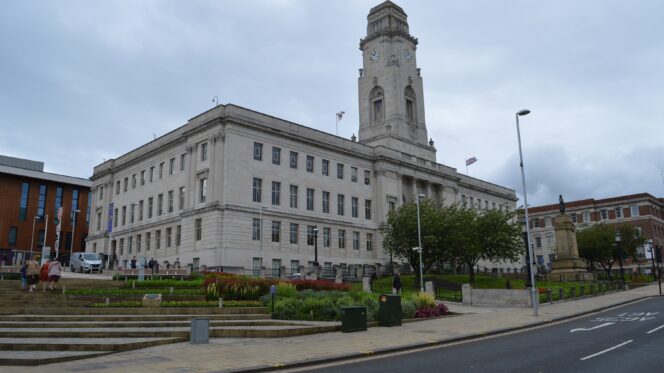The Tories’ Northern Legacy Is Disillusionment and Division

Ten years ago last week, George Osborne stood in the Museum of Science and Industry in Manchester and promised the north of England a ‘northern powerhouse’. It is a pledge that seems laughable today. This week, his party will reap what it sowed at the polls. But for the rest of us, the societal effects of the Tories’ comprehensive mismanagement of the north will reverberate for a decade to come.
Osborne’s promise had three planks.
First, a “radical transport plan” connecting the north’s cities. That plan, Northern Powerhouse Rail, was all but scrapped by Boris Johnson even before the cancellation of the northern leg of HS2 by Rishi Sunak.
Second, investment into university-led science programmes, alongside a boost to the cultural sector and, if you can believe it, improving cleaned-up rivers to boost leisure and tourism. Higher education is gutted, the cultural sector is on its knees, and the less said about the rivers the better.
Third, “true power” in the form of mayors for northern cities on a par with London. The creation of metro mayoral regions has largely been welcomed, but even Andy Burnham in Greater Manchester does not enjoy the democratic authority Sadiq Khan does in London. Other mayors continue to trail behind, cap kept in firmly hand to the cabinet.
Five years ago, Johnson was elected on a manifesto that promised ‘levelling up’ for Britain. It took 18 months for the details to emerge: a £4.8bn fund and, echoing Osborne, a wider promise that if the regions and their institutions brought the plans, the government would back them. In March, the House of Commons public accounts committee was told by the levelling up department there were not “any compelling examples” of delivery, and that only 10% of the funds had been spent.
What did we get for all this hot air? The 2019 general election campaign warned us that disillusionment was setting in across the north at a time when social divisions had become manifest. Since then, both tendencies have worsened. To understand why, we need to consider three things.
Austerity is the most obvious, and the fact that successive cuts to local authority grants since 2010 disproportionately fell on deprived areas whilst demand for social care – and the costs of providing it – rose, heaping additional pressure onto councils. Analysis from the Institute for Government also showed a concentration of spending to mitigate social decline, such as housing budgets being focused on homelessness, and children’s budgets being sunk into safeguarding and children in care. The result is a years-long lack of spending in other areas, and in town centres from Doncaster to Middlesbrough it shows.
A sense of social abandonment and obvious decline has led to widespread political disaffection, with recent totemic cancellations such as the northern leg of HS2 seeming entirely predictable given a wider trend of underinvestment or divestment in many areas of the north. This tendency was worsened further by the political manoeuvring leading up to the 2019 election, during which attempts to frustrate the basic result of the EU referendum rather than carve out a position within its constraints smacked of a patronising attitude towards leave-voting areas. Meanwhile, Johnson’s flagrant disregard for parliamentary process and sovereignty legitimated anti-political impulses, for which he was rewarded that December.
Finally, and least discussed of all – left of the Sun, in any case – is the social division wrought by badly managed migration into areas that are suffering most from local authority cuts. The Tories’ approach has helped precisely no one: migrants who are placed in areas with no choice, little support and few opportunities; councils that are already straining to provide basic services; and prior existing residents who have themselves struggled with the effects of austerity and more recently the cost of living crisis. In a continuation of New Labour’s shameful sloganeering about ‘bogus asylum seekers’ and ‘benefit scroungers’, the Conservatives have fuelled anti-migrant rhetoric whilst doing the opposite of anything to solve actual issues with the system. It is in this swamp that Faragism thrives.
In the coming weeks, Labour will talk up its economic inheritance from the Tories. In the coming months and years, it is likely to use the same rationale for passing further spending cuts and tax increases. Yet in all likelihood, it will choose to gloss over the social inheritance of 14 years of Tory rule.
This is, in effect, Mandelsonian politics: it looks at a large parliamentary majority and, at best, mistakes it for a kind of social consensus – despite the only real consensus being disdain for the Conservatives, whose election it was to lose. At worst, it is a politics that allows – even encourages – Labour to overlook the north, its patronisingly-dubbed ‘heartlands’, as a solid and bankable bloc once again.
It is no coincidence, therefore, that Labour’s election manifesto does away with all talk of levelling up and northern power-anything. Supporters will say this is because Keir Starmer’s Labour is about growth for all of Britain: one-nation Labourism, if you like. Others suspect that Labour in Westminster will once again aim to sweep the north – and the lasting damage the Tories have wrought upon it – under the carpet. Certainly, if growth proves more elusive than anticipated, then the choice will have been a considerable gamble indeed.
Craig Gent is Novara Media’s north of England editor and the author of Cyberboss (2024, Verso Books).


